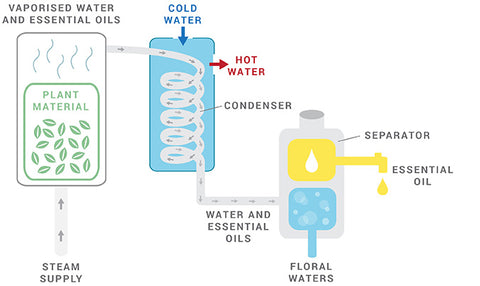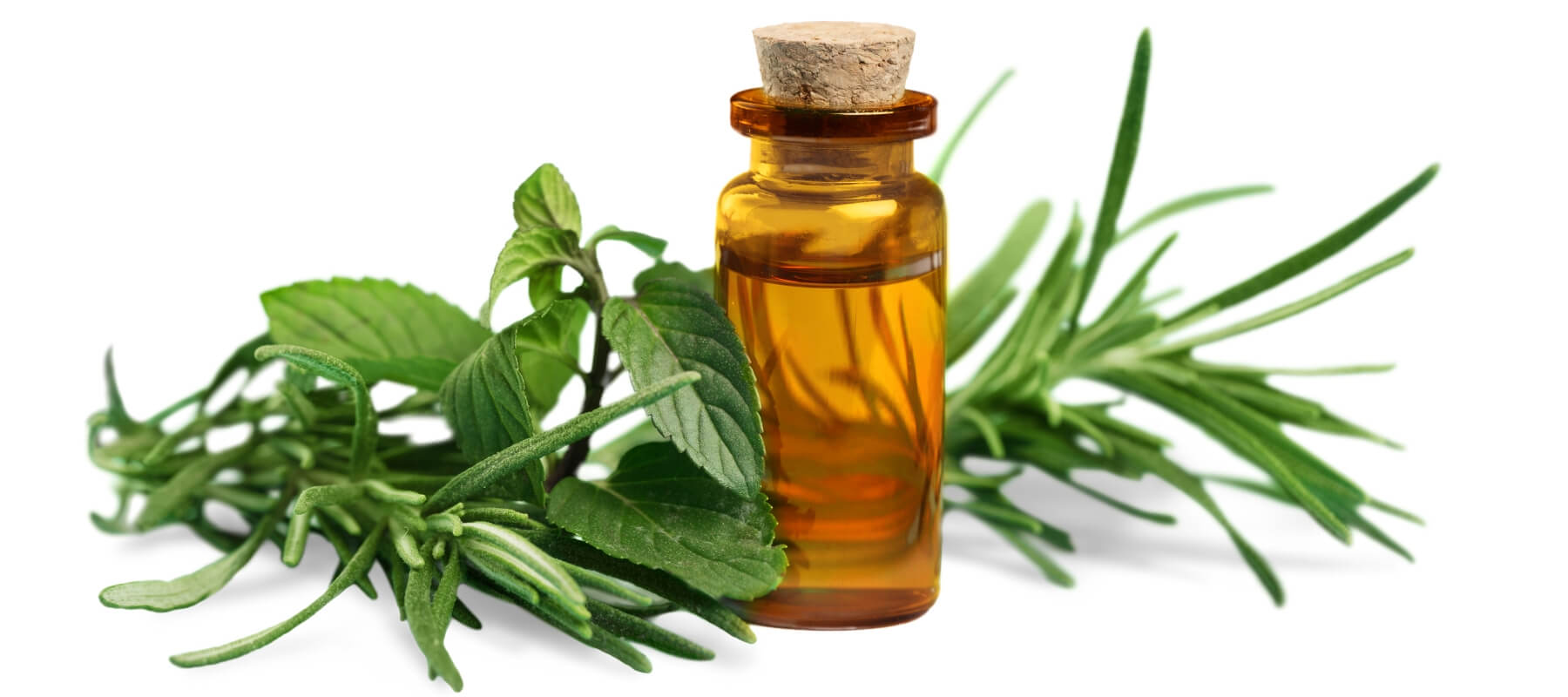Essential Oils - Ultimate Guide
What is an essential / essential oil?
An essential oil is a natural, aromatic oil present in the seeds, leaves, bark, stems, roots, flowers or fruits of plants.
Plants produce this oil to protect themselves from sun damage, temperature fluctuations, bacteria and fungi, etc. Essential oils are mainly extracted from the plant by distillation or cold pressing.
How is an essential oil made?
How the essential oil is obtained depends on the type of oil.
Most essential oils are extracted through a steam distillation process. Steam is drawn through the plant under a certain pressure. This steam takes the essential oil along through a spiral tube.
After this, the steam is cooled down, so that the water vapor is converted into water droplets. Finally, the oil and water are separated from each other and collected separately.
The water is called hydrolate (hydrosol), and you may know it better under names such as rose water, orange blossom water and witch hazel, the oil is essential oil, or often called essential oil.

Essential oils that are often extracted via steam distillation include lavender oil, eucalyptus oil, frankincense oil, peppermint oil, tea tree oil and patchouli oil.
Other extraction methods that are sometimes used include cold pressing, CO2 extraction, maceration and water distillation.
Most citrus essential oils are obtained by cold pressing the skin of the fruit.
Genuine essential oils are always 100% pure, with no added chemicals or fragrances.
What is the difference between an essential and an essential oil?
The terms essential and essential oils are often used interchangeably to describe the same type of oil. In principle, essential oil is the correct Dutch name and essential oil is an Anglicism that comes from the English name "essential oil", referring to the "essence" or in Dutch the "extract" of the plant.
The name essential oil says something about the property of the oil, because it is very volatile and evaporates quickly, just like ether.
In this article we use both names to refer to the same type of oil.
How can you use an essential oil?
Essential oils have 2 popular applications. They can be used as a perfume ingredient because of the wonderful fragrance that most essential oils give off. Or, they can also be used for the medicinal properties most essential oils possess.
For this they are used in 2 ways:
- You can inhale the essential oils, directly or through a diffuser.
- You can apply the essential oils to your skin after mixing with a carrier oil.
How can you use the essential oils on your skin?
First of all, it is very important to point out that it is not recommended to apply essential oils directly to the skin. Therefore, always mix the essential oil with a carrier oil such as argan oil, jojoba or almond oil.
A good ratio is 1-3 drops of essential oil per 100 drops of carrier oil.
Before using a new type of essential oil, it is always best to do a "spot test".
Here you mix 1-2 drops of essential oil with a tablespoon of carrier oil and then apply it to a piece of plaster or fabric. Apply this plaster to the inside of your arm or back and leave it here for 24-48 hours to see if your skin shows any irritation.
As soon as you notice any irritation or other reaction, remove the plaster and wash your skin with mild soap and water.
If no irritation occurs, you can continue to use the oil. However, it is possible that you will develop a hypersensitivity or allergy to the oil in the long term, although this is rare.
Aromatherapy with Essential Oils
Essential oils are often used for aromatherapy, where the vapor of the oil is inhaled to clear the airways, sleep better, reduce pain, or other potential healing effects.
Aromatherapy can be done in a few ways:
- With a diffuser. This is a device with which you can evaporate the essential oil in a room in your house and thus inhale the vapors.
- With a cotton pad. Nice and cheap and easy. Just put a few drops on a cotton pad and put it in a bowl next to you. The oil will evaporate by itself.
- With a bowl of hot water. Put 3-7 drops of essential oil in a bowl of hot water and place your head over the bowl with a towel over it so the steam doesn't escape. Close your eyes while inhaling, the vapor can irritate your eyes.
- With a spray. Mix 5-10 drops of essential oil per 30ml of water and use a spray to atomize this mixture in your bathroom, bedroom or wherever you want.
What can you use essential oils for?
Essential oils are often used to reduce stress, colds and fatigue, heavy legs, sleep problems and asthma.
Essential oils are also very popular in natural beauty products. Whether you suffer from eczema, irritated skin or need hydration, essential oils can solve many cosmetic problems.
Almost all essential oils contain antibacterial, anti-inflammatory and antifungal properties.
Which essential oil is best for my skin?
There is no such thing as the best essential oil. The best essential oil for you is the one that best suits your skin type and needs. Your skin will only come into its own if you adapt your beauty routine to your skin type.
Below we discuss some popular essential oils and their uses.
When using these essential oils, always mix them with a carrier oil first.
Bergamot oil
Bergamot oil is best suited for normal and oily skin. The oil has strong antibacterial properties and is ideal for treating oily skin and eczema or rashes. Bergamot moisturizes the skin without making it greasy, leaving it feeling soft and smooth.
Frankincense oil
Frankincense is suitable for all skin types, but especially for oily and mature skin. The oil helps to stimulate new skin cell generation, and is therefore an absolute must to add to your homemade anti-aging products.
Lavender oil
The great thing about lavender oil is that it is suitable for all skin types, even sensitive skin. It can help repair wounds and damaged skin, and help maintain sebum production.
Patchouli oil
Patchouli oil is a blessing for dry skin. It reduces inflammation, protects the skin from infections, and can help with psoriasis, dandruff and eczema.
Tea tree oil
Tea tree is best suited for acne prone skin. Tea tree oil has antibacterial and anti-inflammatory properties and is good for acne-prone skin. It won't clog pores and can help fight acne.
Why are there danger signs on the labels of most essential oils?
In fact, most essential oils require these warnings.An essential oil sold in the Netherlands and Belgium should bear the correct labels
These regulations are the same for barrels of 200 liters of essential oil as bottles of 5 ml. Some essential oils are highly flammable which can be dangerous in large quantities, but not at all in small bottles. Nevertheless, the danger sign regarding flammability must also be stated on a bottle of 5 or 10 ml.

You often see the warning that the oil should not be used on the skin. This is because for all essential oils it is recommended to only use them diluted on the skin, and always do a “patch test” as described above, because some people are sensitive.

Where can you buy essential oils?
Look at our selection here :-), all our essential oils are pure and natural!
.















